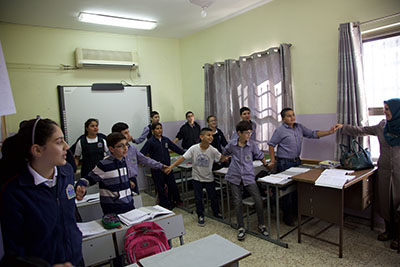East Jerusalem school educates underprivileged Palestinian children
 In East Jerusalem, there is a school with a mandate to help educate children who come from underprivileged Palestinian families. Since its founding in 1952 as a school for girls, Rawdat El-Zuhur has worked to empower the youth of East Jerusalem and the West Bank.
In East Jerusalem, there is a school with a mandate to help educate children who come from underprivileged Palestinian families. Since its founding in 1952 as a school for girls, Rawdat El-Zuhur has worked to empower the youth of East Jerusalem and the West Bank.
“When we see children in need of help, we realize we need to act to help them,” said Rana Qutob, an administrator at Rawdat El-Zuhur for almost two decades.
On a visit to Rawdat El-Zuhur, the Rev. Jim Moos, the executive minister of United Church of Christ Wider Church Ministries, and Peter Makari, area executive for the Middle East and Europe, had a rare opportunity to see the children they help sponsor through the Global Ministries Child Sponsorship program. The two men are part of a leadership delegation from the United Church of Christ and the Christian Church (Disciples of Christ) on a two-week tour of Middle East countries.
Through the Global Ministries Child Sponsorship program, Moos’ family sponsors 10-year-old Siham. Makari’s local church sponsors 4-year-old Nadia. They were moved to sponsor a child for the same reasons that Qutob gave—they saw someone in need, and felt called to act.
Rawdat El-Zuhur, a school for children in grades 1-6, also offers a kindergarten and nursery program to 226 total students who are between the ages of 4 and 12. Of the 226 students, about half are sponsored by various families and congregations through the connection to Global Ministries. The school’s doors are open to Christian and Muslim Palestinian children.
Because of the Israeli military’s occupying presence inside East Jerusalem and the West Bank—considered a violation of international law—children in the West Bank can have difficulty getting to Rawdat El Zahur on time because of the checkpoint, Qutob explains, sometimes needing more than an hour to commute even though they live a 15-minute drive away.
“You have to make something like this for them because of what they see around them,” Qutob said.
 Former students have gone on to become doctors, dentists and stage actors. “We’re proud of all of them. They’re like our own children,” said Qutob, who began teaching a computer class at the school 17 years ago.
Former students have gone on to become doctors, dentists and stage actors. “We’re proud of all of them. They’re like our own children,” said Qutob, who began teaching a computer class at the school 17 years ago.
Rawdat El Zahur began with 20 girls, with the first educators teaching them dancing, writing and the arts. Today, the school operates five days a week, nine months out of the year. There is a playground, a narrow indoor room about 10 feet wide and 20 feet long, that is used to keep students active and houses art class as a method for therapy.
The tuition for each student is about 2,000 Dinar (about $500) annually, about one-fourth the cost of other comparable schools in the area. Rawdat El Zahur administrators estimate the cost of the average private school in East Jerusalem is about 8,000 Dinar ($2,000) each year, but underprivileged families, particularly ones with multiple children, cannot afford that.
“Our primary need now is funding to pay rent for the building and staff salaries,” Qutob said.
Through the Global Ministries Child Sponsorship program, sponsoring a child is $25 per month, and includes a photo and profile of the child. The sponsorship money helps pay school fees, taxes and utilities for operating the school. Through One Great Hour of Sharing, Global Ministries also provides more than $100,000 in support every year to the area through various appeals and endowments.
Said Moos, “We are proud and thankful to be your partners, and for what you do here.”
Learn more about child sponsorship opportunities on the Global Ministries website.
Related News
A Prophetic Call for Justice and Peace in Palestine
The executive leaders of the United Church of Christ have issued the following statement...
Read More‘Love is Greater Than Fear’: Regional Youth Events get to the heart of gospel message
United Church of Christ teens attending this summer’s Regional Youth Events (RYE) are...
Read MoreUCC desk calendars available to order now
Prepare for your day, month and year with the United Church of Christ desk calendar —...
Read More


